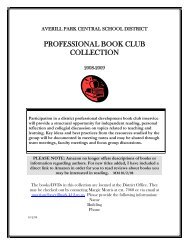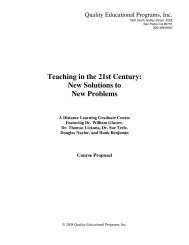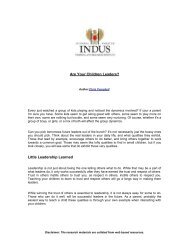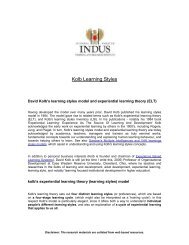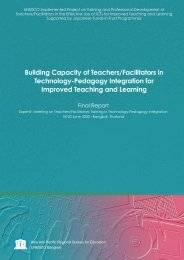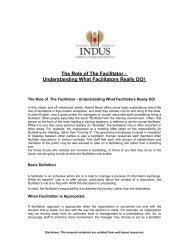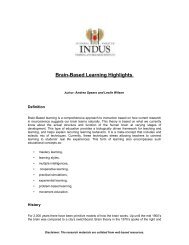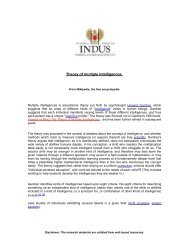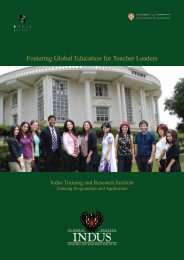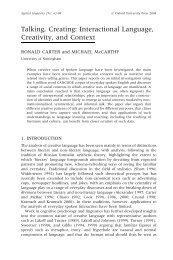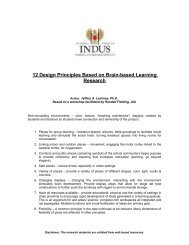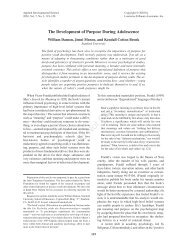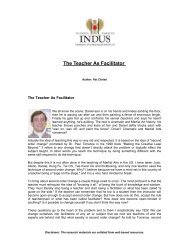Primary Years Programme Making the PYP happen - ITARI
Primary Years Programme Making the PYP happen - ITARI
Primary Years Programme Making the PYP happen - ITARI
- No tags were found...
Create successful ePaper yourself
Turn your PDF publications into a flip-book with our unique Google optimized e-Paper software.
Stage 3: What do we want to learn<br />
The key questions which will drive <strong>the</strong> inquiry .<br />
Form<br />
What is it like<br />
Function<br />
How does it work<br />
Causation<br />
Why is it like it is<br />
Change<br />
How is it changing<br />
Connection<br />
How is it connected to o<strong>the</strong>r things<br />
Perspective<br />
What are <strong>the</strong> points of view<br />
Responsibility<br />
What is our responsibility<br />
Reflection<br />
How do we know<br />
Teacher questions<br />
Stage 4: How best will we learn<br />
Teacher and/or student designed activit ies which will address <strong>the</strong> key questions.<br />
Stage 4<br />
Design a variety of activities which will follow up on <strong>the</strong> students’<br />
questions and <strong>the</strong> lines of inquiry prompted by <strong>the</strong> key questions.<br />
Activities should also be designed with <strong>the</strong> student profile in mind<br />
as well as specifically relating to <strong>the</strong> development of<br />
understandings implicit in <strong>the</strong> key questions. Students should, as<br />
far as possible, be involved in designing activities and deciding on<br />
appropriate strategies for answering <strong>the</strong> driving questions.<br />
Because assessment is integral, all <strong>the</strong>se activities will be used as<br />
ei<strong>the</strong>r formative or summative assessment instruments by <strong>the</strong><br />
teacher and/or students. They should be designed with this in mind<br />
and clear records should be kept to indicate student progress.<br />
Stage 5: How will we know what we have<br />
learned<br />
The strategies which will be used to assess learning.<br />
Stage 5a:<br />
Teaching and assessing are part of <strong>the</strong> same learning<br />
process. Records allow teachers and students to see<br />
progress in <strong>the</strong> development of understandings, skills and<br />
attitudes.<br />
This column should be used in conjunction with <strong>the</strong> listing<br />
of activities in stage 4.<br />
Identify here which activities will be used for formative<br />
and summative assessment, and <strong>the</strong> kinds of strategies and<br />
criteria for assessment that will be used in each case.<br />
Stage 3<br />
Using <strong>the</strong> key questions as a resource, formulate open-ended questions which will<br />
guide students towards an understanding of <strong>the</strong> essence of this unit as described in stage<br />
1, <strong>the</strong> purpose. Three or four well-formulated questions are all that are required to drive<br />
<strong>the</strong> inquiry.<br />
The key question boxes above should be used to record which kinds of questions have<br />
been formulated. It is not necessary to have questions under each key question in each<br />
unit. However, it should be possible to formulate questions in all units about<br />
connections, perspectives and responsibility.<br />
Student questions<br />
Stage 3b<br />
How will we take action<br />
How <strong>the</strong> students will demonstrate <strong>the</strong>ir ability to choose, act and reflect .<br />
Introduce <strong>the</strong> proposed unit to <strong>the</strong> students<br />
and ask <strong>the</strong>m what <strong>the</strong>y would like to find<br />
out. Record <strong>the</strong>ir questions here. Discuss<br />
with <strong>the</strong>m <strong>the</strong> questions you consider to be<br />
important.<br />
In this box write <strong>the</strong> ways in which <strong>the</strong> unit may lend itself to presenting action<br />
choices to <strong>the</strong> students. Not every unit will necessarily have an action component<br />
and in some, <strong>the</strong> action component will develop spontaneously in <strong>the</strong> course of<br />
<strong>the</strong> unit.<br />
Figure 20 <strong>PYP</strong> planner (continued)<br />
© IBO 2000 50



